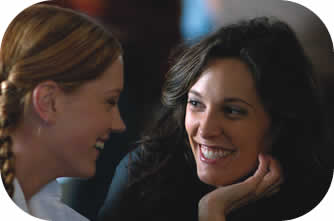Dana Lives
The VQ talks to Erin Cohen ‘95 about playing a pro, changing her name, and being “queen of the dorks.”
The death of Cohen’s character, Dana Fairbanks, the fictional tennis champion and comic core of Showtime’s hit lesbian drama The L Word, hasn’t gone down well with viewers. A visit to the Erin Daniels fan site (Daniels being Cohen’s stage name) reveals a stream of threats to boycott the program as well as demands that the tragedy be reversed via a Dallas-style dream. To kill off a character to breast cancer, the complaints reason, sends a hopeless message to those who suffer from it in real life. For Cohen, such attention was all in a day’s work for a show that censors consigned to their most-wanted lists and that others passed off as more male fantasy than gay realism.
Prior to her years on The L Word, Cohen appeared in the screamer flick, House of 1,000 Corpses, and as the victim of Robin Williams’ snapshot psychosis in the film One-Hour Photo. These days, she has put down the racket and picked up the revolver as the title character in the upcoming television comedy-drama, Julie Reno: Bounty Hunter.
VQ: How did The L Word affect your politics?
EC: Regardless of how gay friendly I thought I was before, as a straight woman I stood at a safe distance from the issues many of my friends faced. Now I take gay issues very personally. You look at gay marriage, think about the motivations behind the conservative crusade against it, and you start to take a closer look at where they so piously put their money. The next thing you know, you’re onto global politics.

VQ: What do you say to critics who said the characters were “too pretty?”
EC: I don’t know why they assume all lesbians have to be butch or, as they would see it, unattractive. There was an incredible pressure on the writers to represent as many people as they could, but of course it’s never possible to represent everyone. The lesbian community in Los Angeles is very small, with its own elite “mafia” of sorts, and I think the show does in fact reflect a certain reality that the writers know well.
VQ: So much for saying the show was written for men.
EC: Sure, a lot of men first watched the show because they were titillated by the subject matter. But sooner or later they were more concerned about the plots, like whether or not Bette was going to get permission to adopt. As far as the male-fantasy thing is concerned, so what? Plenty of people have foot fetishes, and you don’t see them restricting filming to the knee up.
VQ: Is this a form of 21st-century feminism?
EC: Gloria Steinem guest starred on the show, and the director asked me to run lines with her. Soon we got into 1970s definitions of feminism and how today it’s not so much about a fight against men as it is self-definition and empowerment within an identity independent from men. In many ways, the characters on the show prove that a lesbian’s identity is far from restricted to her sexuality.
VQ: So what about being “Erin Daniels?”
EC: I was 22, and the name change did open doors. These days a Jewish last name isn’t the supposed problem it was for an actress 10 years ago. If someone told me now that Cohen just wasn’t going to cut it, they’d have less of an argument than they might have when I decided to go with Erin Daniels.
VQ: And about life playing a bounty hunter?
EC: It was harder leaving The L Word than I thought it would be, but I was ready to go. I’ve been lucky and thrilled to be part of another project so soon after. Julie Reno is a cross between Buffy and My Name is Earl... with a tinge of Lara Croft: Tomb Raider. I play a waitress whose life changes when she is spotted chasing down a customer who tries to run without paying his bill.
VQ: You’re also trying your hand at the other side of the camera.
EC: Yes, optioning a film of the novel Us, by Richard Mason. It’s early days, but I have some excellent people on board so far. The story is set mostly in Oxford and hinges on the conflicting accounts of a past tragedy told by three different narrators. I want to be as authentic to the book as possible, so we’re looking for a British screenwriter and will be filming on location.
VQ: Far away from the Dana Fairbanks fan club then?
EC: For better or for worse, I suppose. We shot one episode while on board an all-lesbian cruise ship, which was a mob scene. It took me 45 minutes to buy a pen in the gift shop, during which time a fan came up to me and said, ‘Thank you so much for giving the dorks someone to look up to.’ As touched as I was by that accolade, I think I’m ready to try life on board a different ship.
Photo credit: Showtime
